Sharepoint Lookup Agains Another List in Form
Though I am a huge advocate of metadata, i cavalcade type that I have never blogged about previously is the Lookup cavalcade in SharePoint. The reason for this is that information technology is a unique type of column you would simply use in very rare scenarios, and information technology does come with limitations. But information technology can get handy in some instances, and I would similar to use this opportunity to explicate it to you and provide some tips on how to employ it efficiently in your SharePoint environment.
What is a Lookup column
A Lookup cavalcade is a cavalcade blazon that allows y'all to connect a list or a library to a column from another list or library y'all have on your site and also pull in other information from that other list and display it the list you are connecting from. If I just dislocated you, let me give yous an case. Say, yous have ii lists in SharePoint. One list for Client contacts with names, emails and phone numbers, and another for Client Company names with visitor address, visitor manufacture, etc. What you can do is acquaintance Contacts with Company names by creating a Lookup column from Contacts list to a Company list. Past doing this association, yous will be able to bring in the Company data such as a company address, company manufacture, etc. into the contacts list, thus having all the information in i giant list. Hopefully, this makes sense at present.
How to create a Lookup column in SharePoint
Let's go ahead and utilise the above case and build this together.
Footstep 1: Build the custom lists (or document libraries)
Just to be clear, you tin can connect non just the SharePoint lists, but also the document libraries. In our case, we are going to connect the Contacts List (with private's names and contact info) with a Clients List (with visitor names and addresses).
The quickest way to dot his would be to create Custom Lists and add together appropriate columns on both. I described how to do this hither.
This is what it looks like in my case:
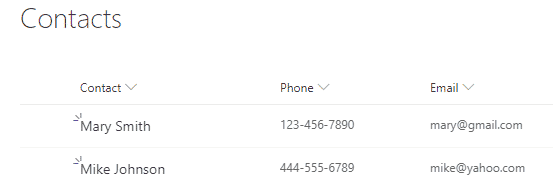
Contacts Listing

Clients/Company List
Step two: Create a Lookup Column
Now we are going to build a Lookup Cavalcade from Contacts List to the Customer List.
- Navigate to the Contacts List
- Click on Gear Icon > Listing Settings (we cannot use +Add together Column option on the front end end since Lookup Column is considered a archetype feature and is not available there)
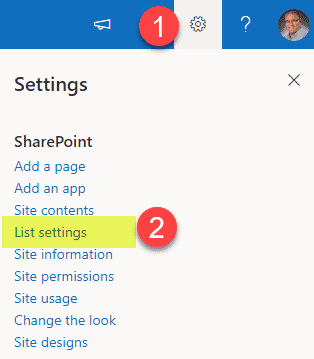
- Nether Columns list, click Create column
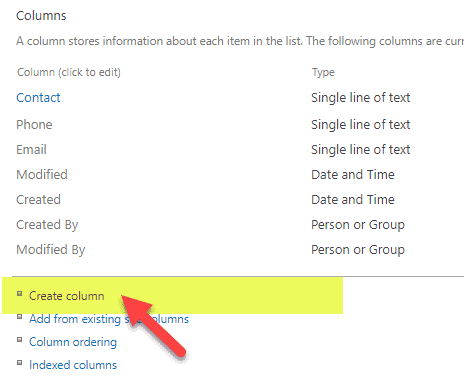
- Requite the column a proper name, then choose Lookup type, in the center of the screen, choose the list or library where you will be looking up info from (in my case Clients), you too have an option to display (bring over) boosted columns from that other list likewise, so check those if demand exist, and so click OK at the bottom of the page

- Your Contact list should look like the image beneath

- Yous tin rename some of those pulled columns, and so they make sense to you (i.e., rename Company:State to State)
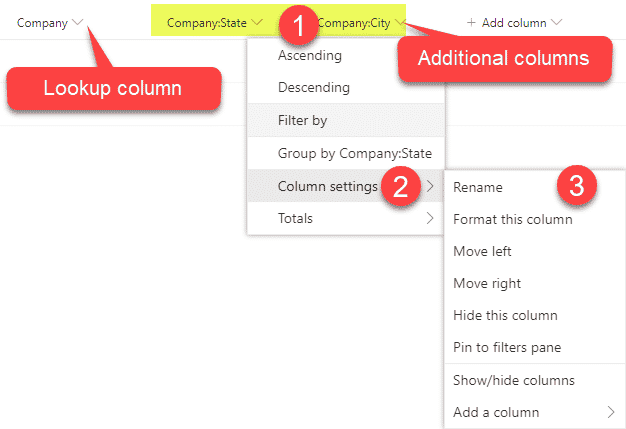
Step three: Tag the entries
- Next, go ahead and tag the entries in your Contact Listing with Company Information
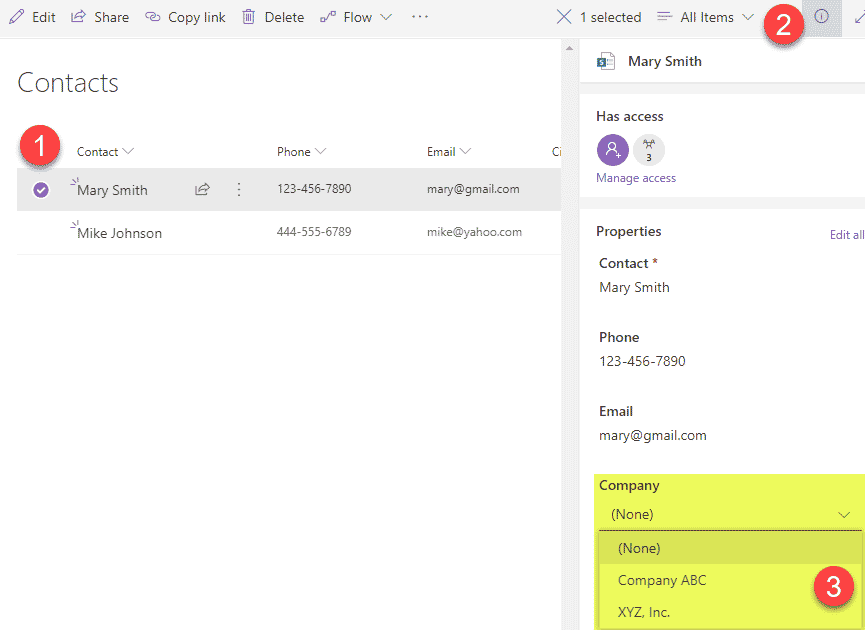
- And this is what it looks similar at the end

Step 4: One to Many Lookups (Optional)
It is important to note that y'all tin can also practice a Lookup column in SharePoint to multiple entries at once. In the instance above, I did a Lookup from the Contact List to Visitor Listing. You can too practise it the other way around and link from Visitor List to multiple Contacts at once.
- Make certain to select Allow multiple values when you Create a Lookup cavalcade.
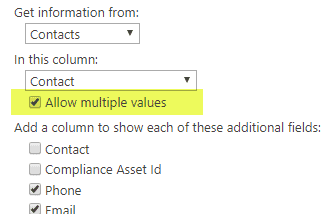
- Tag multiple fields when yous tag an entry
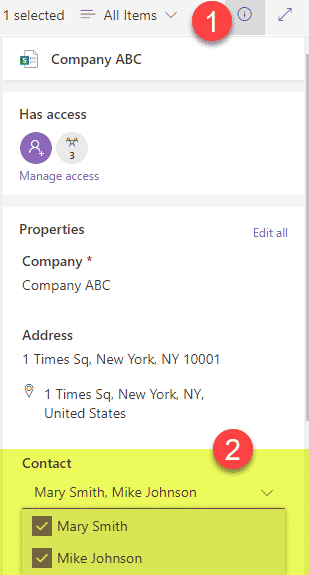
- And this is how information technology looks like when it is all prepare and done.

Lookup column limitations
Before you get besides excited, I want you lot to be aware of several pregnant Lookup column limitations:
- Yous can only create a lookup to sure field types. Reference below prototype for supported and unsupported column types. Image and reference courtesy of Microsoft.
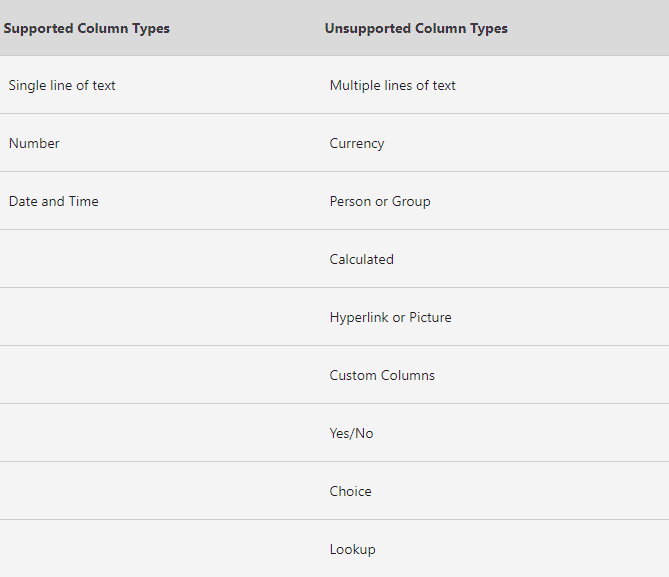
- Lookup might not be applied when you go against a list that contains many entries – drib-down gets lengthy.
- Co-ordinate to Nate Chamberlain, you can only accept a max of 12 lookup columns in a view.
- You cannot create lookups beyond sites (linked lists and libraries need to reside in the same site)
- The lookup column but creates a one-way link. In other words, if you link Contact A to Company ABC, it won't create a link from Visitor ABC to Contact A. So, if y'all desire to practise a 2-way relationship, you will need to do this manually both ways.
Lookup Cavalcade alternatives
Term Shop
If y'all demand a quick ability to link columns on lists/libraries, the Lookup column is definitely a life-saver! However, if you just need a list of metadata (drib-downwardly choices) to exist centrally accessible by various sites and site collections, consider using Term Shop. It allows for much easier metadata management and mitigates the many limitations mentioned to a higher place.
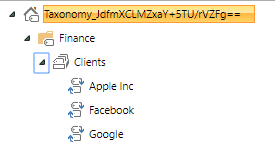
Power Apps
This is not an out of the box characteristic by any means, but if y'all are into Power Apps, you can easily practice Lookups there while addressing all the limitations mentioned to a higher place. Please reference these excellent instructions by Shane Young.
Source: https://sharepointmaven.com/how-to-create-a-lookup-column-in-sharepoint/
Post a Comment for "Sharepoint Lookup Agains Another List in Form"